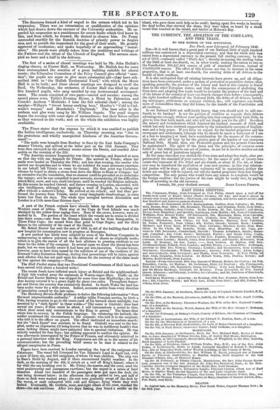THE CURRENCY, THE ABOLITION OF THE CORN-LAWS, AND FREE TRADE.
TO THE EDITOR OF THE SPECTATOR.
Doe Park, near Liverpool, ad February 1846.
Sui-It is well known theta great part of our National Debt of eight hundred millions was contracted in a depreciated currency, and that the whole debt was raised from a depreciated currency to the present full sterling currency, by the act of 1819, commonly called "Peel's Act"; thereby increasing the sterling value of the Debt at least one-fourth, or, in other words, making the nation to owe to the Fundholder 205,457,464 ounces of gold of standard fineness, instead of 154,093,098 ounces. The effect of this famous act was to increase in the same proportion, that is at least one-fourth, the existing debts of all debtors to the benefit of their creditors.
It is also undisputed that all existing interests have grown up, and all obliga- tions have been contracted, under a system of protection or protective duties; that, speaking generally, the produce of the labour and land in this country is dearer than in the other European states; and that the consequence of abolishing the Corn-laws and adopting free trade would be to render the produce of the land and of the labour of the country at least one-fourth cheaper than before: consequently, the eight hundred millions of the National Debt, the debts of all debtors, includ- ing mortgages, settlements on younger children, &c., will represent one-fourth more of commodities than they did before, for the benefit of the Fundholder and all creditors.
Is our National Debt not sufficiently heavy, that you should seek to add one- fourth to its burden? Is not the position of creditors as regards their debtors advantageous enough, without your spoiling him that comparatively hath little, to give to him that bath much, and who will not thank you for the gift? Recollect the misery and wretchedness which followed the kindred measure of 1819, and which has only been rendered supportable by the indomitable energies of English- men and a long peace. If you have no regard for the landed proprietor and his mortgages and settlements, (though why he should be made a holocaust of I am at a loss to imagine,) at least have consideration for the masses of the commu- nity, who after all bear by far the greater part of the burden of our enormous National Debt. Should, then, our Protective system and the present Corn-laws be maintained? The spirit of the times and the principles of common sense forbid it: but whilst you do one act of justice, do not let it involve another act not only of great but of gratuitous iniquity. At the same time that you abolish the Corn-laws and adopt free trade, alter pro- portionately the standard of your currency: let the ounce of gold of twenty-two carats fine represent 31. 17s. 10id. and one-fourth, or about 41. 17a. 4d., or what- ever may be considered the equivalent of year new system: in this way substan- tial justice will be done; all existing contracts will be maintained, neither the debtor nor creditor will be injured, nor will the landed proprietor then fear foreign competition. The only person who would have any reason to complain would be the foreign creditor: but the justice of his case might be easily met, by paying him off according to the old currency. I remain, Sir, your obedient servant, Jotm Lamm PHIPPS.


























 Previous page
Previous page